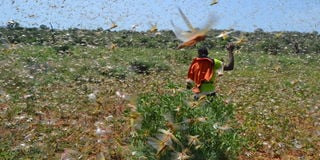Premium
Farmers worry as desert locusts invadeTharaka Nithi

A resident of Ntoroni in Tharaka North Sub County battles desert locust on January 21, 2021.
Gigantic swarms of desert locusts have invaded farms in Tharaka North in Tharaka Nithi County.The destructive hoppers were also reported in parts of Tigania last week.
The locusts started landing on farms and bushes in Ntoroni, Mpondoni, Kiruaki, Irereni, and Ngaani villages on Wednesday evening from the Meru National Park direction.
Farmers have recorded massive destruction of crops and are worried that they may lose everything to the insects if the government does not spray them immediately.
The other counties where the swarms have been reported in a second wave of invasion are Wajir, Garissa, Marsabit, Samburu, Laikipia and Isiolo.
Spraying
Speaking to the Nation on Thursday morning, Tharaka-Nithi County Agriculture Executive Njue Njagi said he is organising how to spray the swarms before they cause more harm.
He said county trained scouts are already on the ground monitoring the movement of the insects and sending information to the regional command centre in Masinga using the e-Locust monitoring and data transmission equipment.
“Our scouts are monitoring the movement of the locusts using an electronic device that is sending coordinates to the regional command centre in Masinga,” said Mr Njue.
Most destructive stage
He said the locusts in the county are young and at the most destructive stage.
He added that Governor Muthomi Njuki, who is also the chairman of the Council of Governors Agriculture Committee, in consultation with Agriculture CS Peter Munya, are looking for a solution to the menace.
During last year’s invasion, the locusts destroyed more than 2,400 metric tonnes of food in the county after wreaking havoc on 30,000 acres in 18 sub-locations, according to data from the Tharaka Nithi department of agriculture.
The Food and Agriculture Organisation (Fao) has warned that any rainfall that occurs in the coming weeks will cause swarms to mature and lay eggs that will hatch and give rise to hopper bands in February and March.
It also asked all the invaded countries to conduct survey and control operations to reduce further migration and breeding of the insects.





